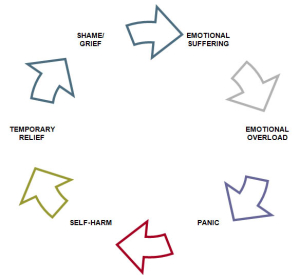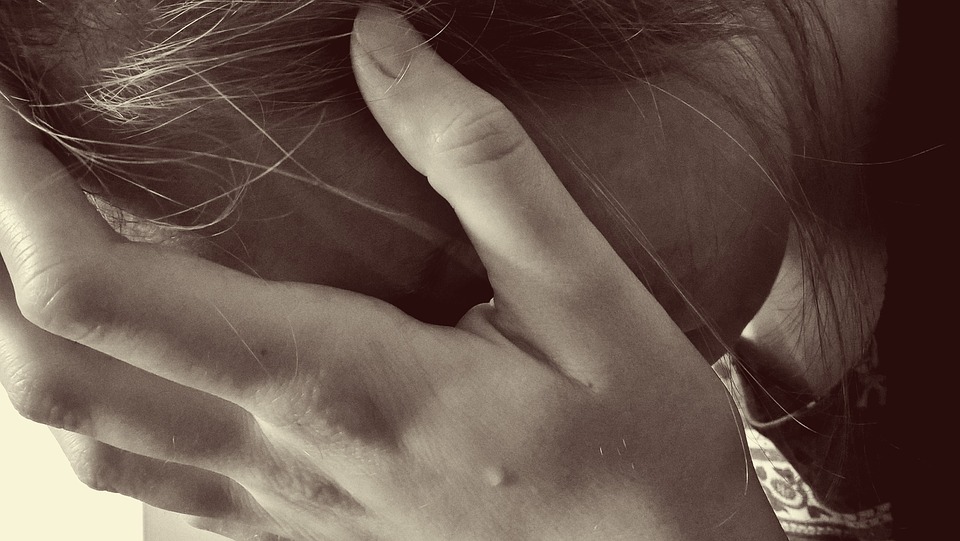Self-harm is becoming increasingly common; the more we are able to talk about it, the more we realise that it affects more people than you would think. The Mental Health Foundation states that:
- It is believed that 10% of young people self-harm, but it could be as high as 20%.
- This means that at least two children in every secondary school classroom have self-harmed at some time.
- Most young people reported that they started to hurt themselves around the age of 12.
If we stop and think about it, that’s quite a high statistic, and it should be taken seriously.
There are many myths surrounding self-harm, such as it being a cry for attention – these will be tackled a little later in the post, first I just wanted to clarify what self-harm actually is.
.What is self-harm?
Self-harm is a coping mechanism for when people feel overwhelmed by their negative thoughts and emotions. People, and especially teenagers who are unable to express their true emotions, for whatever reason, don’t know how ‘to get rid of’ these overpowering feelings, and they find that self-harm, gives them a small temporary release.
“Self-harm describes any behaviour where someone causes harm to themselves, usually as a way to help cope with difficult or distressing thoughts and feelings. It most frequently takes the form of cutting, burning or non-lethal overdoses. However, it can also be any behaviour that causes injury – no matter how minor, or high-risk behaviours.”
So it’s any behaviour that can cause you harm or injury as a way to deal with difficult emotions. There are theories that tattoos and excessive exercising, over-eating, smoking, substance misuse and other coping mechanisms can also be classed as ‘self-harming.’ This will be covered in a later post, as there is a whole other side to the ‘accepted’ forms of self-harming.
The cycle of self-harm
The more a person self-harms, the more reliant they become on that coping mechanism (as with any coping mechanism). This can then begin a pattern which the person finds themselves in – people can get trapped going round and round through the stages of that cycle, it can be difficult to break that cycle without outside help.
 Because self-harm usually starts as a way to relieve the build-up of pressure from distressing thoughts and feelings, it can give temporary relief from the emotional pain the person is feeling. It’s important to stress that this relief is only temporary as, the cause of the upsetting emotions is not addressed.
Because self-harm usually starts as a way to relieve the build-up of pressure from distressing thoughts and feelings, it can give temporary relief from the emotional pain the person is feeling. It’s important to stress that this relief is only temporary as, the cause of the upsetting emotions is not addressed.
After someone has self-harmed, and after the short-lived relief has worn off, feelings of guilt and shame may appear. Guilt that they know what they’re doing is wrong; self-harm is such a taboo subject, and as a society we have very black and white views on self-harming, the person may feel ashamed in telling anyone about how they cope. This can then lead to self-incrimination and judgement. So if we think about the teenager who is self-harming, he/she is not only having to deal with the overwhelming feelings she is suffering from, but then to add on top of that is shame and guilt (which can be powerful by themselves let alone thrown into the mix of other painful emotions) and we have a teenager who will self-harm again, as it’s the only coping strategy they know of.
As you can see this can then become someone’s ‘normal’ way of dealing with life’s difficulties. This makes it crucial that we talk to them as early as possible to get them the right support and help they need. Learning new coping strategies to deal with these difficulties can make it easier to break the cycle of self-harm.
Why would someone self-harm?
 Some people can manage their difficulties and emotions by talking to their friends and family, however what if you couldn’t talk to anyone about what you’re feeling? There are many reasons why we feel that we can’t open up about what is happening to us; fear of being judged, fear of being blamed; fear of something happening to our loved ones, if we say something.
Some people can manage their difficulties and emotions by talking to their friends and family, however what if you couldn’t talk to anyone about what you’re feeling? There are many reasons why we feel that we can’t open up about what is happening to us; fear of being judged, fear of being blamed; fear of something happening to our loved ones, if we say something.
When we don’t express our emotions and talk about the things that are making us so distressed, angry or upset, the pressure can build up and become unbearable. People who use self-harm as a coping mechanism, turn this on themselves and use their bodies as a way to express the thoughts and feelings they can’t tell anyone else. They harm themselves, or harm themselves more often when these feelings ‘get too much.’
Reasons to self-harm are personal and vary from person to person. Some of the reasons that young people report as reasons that lead them to self-harm include:
- Difficulties at home – controlling parents, parents in a violent relationship, problems with siblings.
- Abuse – physical, emotional, sexual.
- Arguments or problems with friends.
- School pressures, including pressures to achieve high results from parents.
- Bullying.
- Depression.
- Anxiety.
- Low self-esteem.
- Transitions and changes, such as changing schools.
- Alcohol and drug use.
- Bereavement.
More often than not, teenagers are dealing with many if not most of the above situations; this can then lead to them quickly being overwhelmed. They don’t know what to do, or who to turn to, so they turn on themselves.
The myths surrounding self-harm
 Because self-harm is something we don’t talk about openly as a society; when we find that someone we know and love is self-harming our first reaction is to tell to them to stop (as if it is ever going to be that easy), and because we want to protect them we often don’t mention it again or tell anyone else about it. This then creates an aura of secrecy around the subject, and because we’re not openly talking about ‘why’ they’re doing it, they don’t stop, they just lie to you – which is easier for them to say, and easier for you to hear. So really, neither of you are actually addressing the cause of why your teenage daughter, son, sister, brother or friend feels compelled time and time again to hurt themselves.
Because self-harm is something we don’t talk about openly as a society; when we find that someone we know and love is self-harming our first reaction is to tell to them to stop (as if it is ever going to be that easy), and because we want to protect them we often don’t mention it again or tell anyone else about it. This then creates an aura of secrecy around the subject, and because we’re not openly talking about ‘why’ they’re doing it, they don’t stop, they just lie to you – which is easier for them to say, and easier for you to hear. So really, neither of you are actually addressing the cause of why your teenage daughter, son, sister, brother or friend feels compelled time and time again to hurt themselves.
There are lots of myths attached to self-harm and negative stereotypes can be powerful. They need to be challenged because they stop people from talking about their issues and asking for help.
MYTH: Self-harm is attention-seeking
One of the most common stereotypes is that self-harm is about ‘attention seeking’. This is not the case. Many people who self-harm don’t talk to anyone about what they are going through for a long time and it can be very hard for people to find the courage to ask for help. They go to great lengths to hide their marks; even after they have stopped, many people are ashamed of what they went through and hide the scars they are left with.
MYTH: Only girls self-harm
It is often assumed that girls are more likely than boys to self-harm, however this is untrue. Because boys deal with depression, anxiety and fear in a more aggressive way, may mean that their methods of self-harm are different to girls, but ultimately high risk behaviours and self-destructive habits also can be very harmful.
MYTH: People who self-harm must enjoy it
Some people believe that people who self-harm take pleasure in the pain or risk associated in the behaviour. There is no evidence that people who self-harm feel pain differently than anyone else. The harming behaviour often causes people great pain, but their emotional pain is so heightened that the physical pain they feel is almost a relief compared to how they are feeling ‘inside.’ For some, being depressed has left them numb and they want to feel something, anything to remind them they are alive, even if it hurts. Others have described this pain as punishment; people who have been abused want to harm the skin that has been violated. This myth, belittles everything that people who self-harm have gone through, causing more distress and pain.
MYTH: People who self-harm are suicidal
Self-harm can be viewed as a suicide attempt by people who don’t understand it. For many people self-harm is about trying to cope with difficult feelings and circumstances, not ending their life completely. Some people have described it is a way of staying alive and surviving these difficulties. However, some people who self-harm can feel suicidal and might attempt to take their own life; especially if their way of coping doesn’t seem to working anymore which is why it must always be taken seriously.
People often link self-harm to suicide but for me it was something very different; it was my alternative to suicide, my way of coping even though sometimes I wished that my world would end.
MYTH: It’s a phase they’ll get over it
Some people think that self-harm is a phase, and that soon enough their teenage daughter / son will get over it. It’s a very relaxed attitude that shows that people who believe this myth don’t truly understand mental health difficulties or how overpowering negative feelings can be. As a teenager, even though you have some independence, there are many things still controlled for you, add to that difficulties at school, not being able to control your emotions and the changes your body is going through, can make it a very challenging time. Your parents not taking you seriously can add to your feelings of low self-esteem.
MYTH: You can talk them out of it
Some people think that guilt, or tears will stop their loved one from self-harming; this does more harm than good, because on top of the guilt they are feeling anyway they will feel that they’ve let you down – that will make them feel worse about themselves.
Getting aggressive with someone who is self-harming will not stop them from self-harming either. This technique is based around fear – if you think that instilling fear that self-harming will get them punished, will work, then you have completely misunderstood self-harming.
Rather than trying to talk them out of it, if you talk to them with the intention of understanding what they are going through may open the lines of communication between the two of you.
If you are self-harming, you are not alone, lots of information and support is available. It is possible to live without self-harm; it is important to know that you won’t always feel the way you do now, talking to someone you trust or a healthcare professional can help you find other options for coping with the emotional pain you are feeling. With the right help and support most people who self-harm can and do fully recover.
If you want to talk to someone regarding the issues raised in this blog, please contact us. We are offering a free two week trial for online counselling.


Leave a Reply